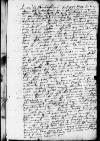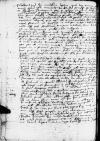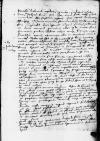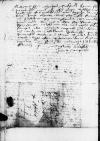⌊⌋, clementissime Domine, 4 Augusti scriptae ⌊Lubavii⌋, optima fide redditae fuerunt hic et exhila<ra>verunt me maxime. Quibus eodem die respondi, sed quia commoditatem mittendi non habui, litterae nescio, ubi perierunt. Quod ad me attinet, quia ea es humanitate praeditus, ut id quoque scire desideres, paucis accipe. Discedentem ⌊Cracovia⌋ ⌊reverendissimus dominus Cracoviensis⌋ equo optimo et honesto viatico donavit. Sperabam me ⌊Viennae⌋ inventurum ⌊reverendissimum dominum Lundensem⌋, verum ille biduo priusquam eo venirem, profectus fuerat per equos dispositos in ⌊Flandriam⌋, quae res me nonnihil male habebat, propterea quod decreveram apud illum mensibus aliquot manere{m}, ne in medio aestu in ⌊Italiam⌋ venire cogerer. Paucis ergo diebus commoratus ⌊Viennae⌋ sum, rogatu ⌊Fabri episcopi⌋, qui me blandissime excepit et litteras ad ⌊Aleandrum⌋ commendaticias dedit. Tandem ergo illinc profectus sum solus neque ullum inveni itineris comitem, priusquam venissem ad ⌊Sanctum Vitum⌋. Nihil tamen gratia Dei passus sum incommodi. Perveni autem ⌊Venetias⌋ postridie Pentecostes[1] in medio maximi aestus, nam dicebant tum hic omnes eam aestatem tam fuisse calidam, ut vix meminerint calidioris. Interim nescio, quo pacto, cum admiratione omnium patientius aestum toto illo tempore tuli, quam Italorum quisquam. Accepit me in aedes suas ⌊Aleander⌋ et humaniter tractavit, sed hoc unum mihi visum est incivilissimum: non permisit mihi usum ullius omnium librorum suorum. Quae res turbavit omnia consilia mea, nam ultra pretium equi, quem undecim ducatis vendideram, parum mihi pecuniae reliquum fuerat. Conducenda fuit opera ⌊Eliae⌋ Iudaei singulis mensibus ducatis duobus, vestes emendae. ⌊Aleander⌋ enim, praeter victum, ne obolum quidem unum suppeditavit. Hac ergo ratione factum est, ut apud illum durare diu non potuerim. Inveni ⌊hominem⌋ esse talem, qualem tu mihi eum saepe descripseras, in quo nihil esset, praeter cerebro vacuum caput. Doleo libellum meum infami illius nomine conspurcatum. Sum nunc apud nobilissimum Graece et Latine doctissimum Anglum, ⌊Reginaldum Polum⌋, qui de rege suo idem iudicat quod tu, hoc est unam hanc stultitiam obscurare reliquas universas illius dotes. Hic me tractat humanissi[me]. Quare Tuam Reverendissimam Paternitatem oro, ne pro me sit sollicita amplius. Ambior a plurimis et maximis, sed continebo me adhuc ad menses aliquot hic, donec resecavero crassiores ex prophetis nodos. Legi hic magno studio ⌊Esaiam⌋ cum domino meo. Non puto me in vita mea quicquam legisse elegantius, nihil esse, diceres, facundiam ⌊Ciceronis⌋, variationes troporum ⌊Homeri⌋. Spero futurum, ut Litterae Sacrae suam nativam recipiant faciem, quod si fiat, nihil libentius vel maiore cum voluptate homines lecturos puto.
Psalterium tuum hic avidissime legitur. Credo hoc triennio plus tricies editum esse. Curaverat hic edendum, priusquam ego huc venir[em], dominus ⌊Gaspar Contarenus⌋, qui te optime novit. In ⌊Hispania⌋ enim oratorem agebat apud imperatorem eodem tempore quo tu. Hic homo doctissimus, in omni doctrinae genere et moribus integerrimus, incred[i]bili me favore prosequitur. Dedi illi gustum aliquem ⌊Esaiae⌋ in capitibus aliquot, quae res illi animum reddidit spemque fecit certam futurum, ut prophetae et reliqui veteris testamenti, a nullo umquam post apostolorum tempora intellecti, tam faciles fiant, ut ne commentariis quidem ullis indigeant.
⌊Lovanienses⌋ miserunt mihi honorificum studiorum meorum testimonium. Psalterium tuum nescio quis in linguam Flandricam vertit. Miseram commentariolum in duas ⌊Divi Pauli⌋ epistolas hic nonnihil auctu[m] ad dominum ⌊Grandevelum⌋ hortatu cuiusdam ⌊Hispani⌋ in aulam caesaris. Is mihi rescribit humanissimam epistolam, in qua mihi gratias agit pro illo munere immensas, hortaturque vehementer ut pergam in eo studiorum genere. Meminit obiter domini ⌊Cornelii Schepperi⌋, quem in ⌊Hispaniam⌋ tum salvum rediisse scribit, ⌊Nicolai⌋ quoque nostri, ⌊praesidis Mechliniensis⌋ filii, qui secretarius est ⌊caesaris⌋.
Valde cuperem ⌊Philippum⌋ respondere, ut res possit tractari latius. Cuperem enim ⌊Paulum⌋ esse quam notissimum omnibus, quod fieri puto posse hoc tempore commodissime. Res est maxima et qua ad sedandos omnes tumultus nulla posset esse accomodatior. Si quid Tua Reverendissima Dominatio audierit vel ⌊Philippum⌋ vel aliquem ⌊Philippi⌋ nomine contra moliri, gratissimum fecerit, si indicaverit. Ego hic tibi coram Deo Omnipotente et ⌊Iesu Christo⌋ domino et serva{r}tore nostro affirmo nulla me alia causa fuisse ad scribendum in ⌊Paulum⌋ adductum, quam ut possem, si forte Deo Optimo Maximo visum fuerit, paci et publicae tranquillitati aliqua ex parte consulere. Adhuc mihi videre videor certissimam illam in Paulino contextu perpetuita[te] plane Paulinam libris sacris reliquis sic consonam, ut [ne] syllabam quidem ullam adduci posse putem, quae per[ecto] illi et divino plane tenori non sit per omnia cons[ona]. Si mihi cum ⌊Philippo⌋ daretur venire in colloquium, [spero] me posse illi ostendere rem ita habere nec posse a[liter]. Interim si hic erro, qui annis plus viginti sex mihi eam rem tamquam scopum proposui, in quem alia omnia mea dirigerem, nusquam mihi fidem adhibendam posthac puto. Nescio, quomodo haec mihi inter scribendum occurrant, cum tale nihil scribere cogitarim. Dominatio Tua Reverendissima cupit a me litteras longas, habeat ergo supra quam cupit longissimas.
⌊Pontificem⌋ habemus capularem, vix audeo ex aliorum relatu dicere, et delirum senem, qui hoc rerum statu, tamquam nihil incumbat illi praeterea negotii, dat operam iudiciariae astrologiae et inveniendis familiaribus cacodaemonibus. Fecit cardinales duos cognatos, alterum sedecim, alterum, ut dicunt, annorum quindecim. Illos ipse vocat suos pavones, quibus desint adhuc caudae, servat ergo sacerdotia omnia opimiora illis in caudarum ornamenta. Nulla est spes de illo maior quam quod brevi moriturus putetur. Alienavit a se paucis his mensibus vere Christianorum omnium principum animos, imperatoris maxime. Missurus fuerat legatum ad ⌊Iannusium⌋ in ⌊Hungariam⌋, sed ⌊Ferdinandus⌋ negavit illi transitum. Minatur bellum ⌊duci Urbinati⌋. Non video, qua rectiore via penitus subverti posset totus pontificatus, quam hac. ⌊Imperatori⌋ omnia sunt secunda. Intra paucos menses iterum inventae sunt insulae auri multo feraciores quam ullae antehac inventae aliae. Parat classem ingentem centum triremium et magnarum navium totidem, praeter parvas plurimas, in quam impositurus dicitur viginti quinque milia militum. Speratur hoc proximo vere cum coniuge sua venturus in ⌊Neapolim⌋, impetravit enim ab ⌊Hispanis⌋, ut novem illi annis abesse cum illa liceat. Hoc si evenerit, plurimorum et maximorum erit causa bonorum et inter cetera quoque hoc ego futurum spero, ut te aliquando iterum videam.
De ⌊Turca⌋, quamvis omnino certissima adhuc ad senatum non sint allata nova , colligitur tamen multis et verisimilibus argumentis illum in proelio a rege Persarum ⌊Sophi⌋ superatum esse, idque nostrum ⌊imperatorem⌋ non ignorare et propterea tantopere urgere, ut parata sint omnia. ⌊Genuae⌋ iam quadraginta triremes novae instructae sunt.
⌊Barba Rossa⌋ occupavit regnum ⌊Tynnis⌋, sed speratur non diu ill[u]d possessurus.
In ⌊Flandria⌋ veteres amici omnes recte valent praeter ⌊Petrum Aegidium⌋ et ⌊fratrem illius⌋ canonicum et cantorem Antwerpiensem, qui anno superiore ambo mortui sunt.
Quod Reverendissima Tua Paternitas ⌊Brixiolo⌋ facit, non aliter gratum est, quam si ex me prognatus esset. Cuperem illum eo usque in litteris promovere, ut Germanice et Polonice legere<t>.
Mitto Dominationi Tuae Reverendissimae Theologiam Pasquilli Romani, sed non quemadmodum meus ille optimus alioqui ⌊Nybschyzius⌋ adiunct[am] litteris hisce, sed inclusam, ne tam longinquo itinere pere[at], sicut periit carta illius, qua iussus fuerat ad me perscribere, quae in regionibus illis nova fierent, quorum valde tum eram et adhuc sum sciendi cupidus. Reverendissimae Dominationi Tuae molestum non erit meis verbis salutare principes illos, viros dominos ⌊vayvodam Culmensem⌋, dominum ⌊Ioan[nem] von Werden⌋, ⌊dominum castellanum Gedanensem⌋, qui me humanissime tractavit in itinere, et alios, quos commemorare longum esset. Spero me brevi scripturum plu[ra]. Valeat Tua Reverendissima Dominatio.



